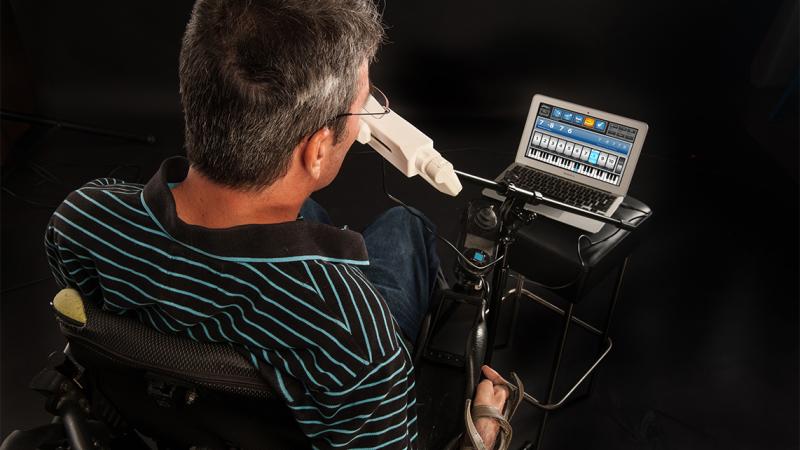June 8 Conference Supported by Christopher and Dana Reeve Foundation
May 22, 2013

Sponsored by the Christopher and Dana Reeve Foundation, a one-day conference at Rensselaer Polytechnic Institute will center on technologies that aid mobility disabled people in making art and music.
Just as sports tools like the sit-ski aid disabled athletes, and work tools like Braille keyboards aid visually impaired employees, artists and designers are developing a series of “assistive technologies” that open the arts and music to the mobility impaired, said Jonas Braasch, director of the Center for Cognition, Communication, and Culture (CCC). The center is hosting the conference in conjunction with the Deep Listening Institute on June 8.
“A lot of the current technology for disabled people focuses on addressing everyday needs like working, eating, moving about the house,” said Braasch. “That’s important, but it’s also important that people with special needs have access to an outlet for their creativity. We are working to give people the ability to express themselves creatively.”
The International Symposium on Assistive Technology for Music and Art (ISATMA 2013), made possible with funding from the Christopher and Dana Reeve Foundation and Rensselaer Polytechnic Institute, is free and open to the public. The conference will be held June 8 from noon to 5 p.m. in Studio 2 of the Curtis R. Priem Experimental Media and Performing Arts Center (EMPAC) in Troy, N.Y. Space is limited and reservations are strongly recommended. For reservations, contact Braasch at braasj@rpi.edu.
Braasch said the challenge of designing assistive technologies is also a learning opportunity for designers.
“People with special needs often use a creative approach to accomplish their goals and we can learn from them,” Braasch said. “Because they do things in a very new way, they can help you to leave the beaten path of how we ordinarily do things. It might open your eyes to understanding things that you haven’t seen because you’re boxed in by your own experience.”
ISATMA 2013 is specifically devoted to new technologies that provide artists with spinal cord injuries and other mobility-restricting disabilities access to creative tools for making their own multimedia works. The symposium will address adaptive interfaces to control digital workstations with limited mobility and accessible telepresence environments where groups can collaborate regardless of disability.
Talks, technical demos, music presentations, and a panel discussion will lay out the current state of assistive technologies and discuss future needs and trends.
Braasch said he hopes the conference will be a meeting ground for artists, designers, people with disabilities (many of whom are themselves the designers of tools for the disabled), and anyone with an interest in increasing access for the disabled.
Confirmed guest speakers and artists include: John Adams of Switch Machine; Yael Erel, Erik Klein, Tobias Koslowski, Leaf Miller of Abilities First; Pauline Oliveros of the Deep Listening Institute and a professor of arts at Rensselaer; David Whalen of Jamboxx; and Ruud van der Wel of My Breath, My Music.
One of 10 Institutewide research centers at Rensselaer, the CCC was launched in November 2012, with three initial core research areas: cross-modal displays—which seek to employ all human sense in understanding and exploring data; mixed reality—in which data overlaid on the real world enriches learning and research environments; and synthetic characters—computer programs intended to simulate an independent individual.
The event will be streamed live at: